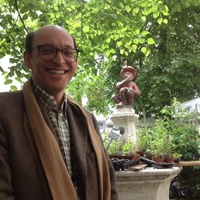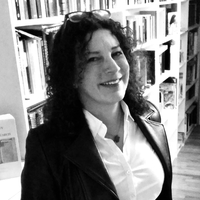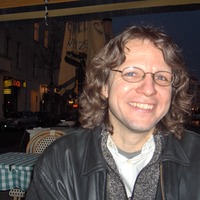
Andrew J Hicks
Andrew Hicks’ research focuses on the intellectual history of early musical thought from a cross-disciplinary perspective that embraces philosophical, cosmological, scientific and grammatical discourse in Late Antiquity and the Middle Ages, and spans the linguistic and cultural spheres of Latin, Greek, Persian, and Arabic. His first book, Composing the World: Harmony in the Medieval Platonic Cosmos (Oxford University Press, 2017), won the ASCAP Foundation Deems Taylor/Virgil Thomson book award (2018) and the Society for Music Theory's Emerging Scholar book award (2018). He collaborated with Fr. Édouard Jeauneau on John Scottus Eriugena’s Commentary and Homily on the Gospel of John (CCCM 166, Brepols 2008), and he is currently preparing the first edition of William of Conches’ Glosulae super Priscianum (Brepols). His published essays range across the history of music theory, late ancient and medieval Pythagoreanism, the reception of Martianus Capella, textual criticism, and musical metaphors and modalities in Classical Persian literatures. He won the 2018 Berlin Prize from the American Academy in Berlin for research on his next book titled The Broken Harp: Listening Otherwise in Classical Persian Literature.
less
Related Authors
Barbara Haggh-Huglo
University of Maryland
Manuel Pedro Ferreira
Faculdade de Ciências Sociais e Humanas - Universidade Nova de Lisboa
Xenia Sandstrom-McGuire
Augsburg University
Andreas Kramarz
Legion of Christ College of Humanities
Hedvig Bubnó
Karoli Gaspar University
Christine Oefele
University of Berne
Chiara O. Tommasi
Università di Pisa
InterestsView All (12)









Uploads
Books by Andrew J Hicks
Taking in hand this current "discovery" that we can listen to the cosmos, Andrew Hicks argues that sound--and the harmonious coordination of sounds, sources, and listeners--has always been an integral part of the history of studying the cosmos. Composing the World charts one constellation of musical metaphors, analogies, and expressive modalities embedded within a late-ancient and medieval cosmological discourse: that of a cosmos animated and choreographed according to a specifically musical aesthetic. The specific historical terrain of Hicks' discussion centers upon the world of twelfth-century philosophy, and from there he offers a new intellectual history of the role of harmony in medieval cosmological discourse, a discourse which itself focused on the reception and development of Platonism.
Hicks illuminates how a cosmological aesthetics based on the "music of the spheres" both governed the moral, physical, and psychic equilibrium of the human, and assured the coherence of the universe as a whole. With a rare convergence of musicological, philosophical, and philological rigor, Hicks presents a narrative tour through medieval cosmology with reflections on important philosophical movements along the way, raising connections to Cartesian dualism, Uexküll's theoretical biology, and Deleuze and Guattari's musically inspired language of milieus and (de)territorialization. Hicks ultimately suggests that the models of musical cosmology popular in late antiquity and the twelfth century are relevant to our modern philosophical and scientific undertakings. Impeccably researched and beautifully written, Composing the World will resonate with a variety of readers, and it encourages us to rethink the role of music and sound within our greater understanding of the universe.
Les deux œuvres sont dignes d’intérêt, non seulement pour elles-mêmes, mais aussi pour l’influence qu’elles ont exercée sur la pensée occidentale. L’influence de l’homélie est illustrée par le grand nombre de manuscrits qui nous en ont transmis le texte. La précédente édition (Sources chrétiennes 151) en dénombrait cinquante-quatre, la nouvelle édition en dénombre soixante-treize. Tout différent fut le sort du commentaire, puisqu’il ne nous a été conservé qu’en un seul manuscrit, malheureusement mutilé: Laon, Bibliothèque municipale 81. Mais ce manuscrit est précieux, puisqu’il est l’exemplaire de travail de l’auteur, annoté par lui. Il n’a pas quitté Laon depuis le IXe siècle. Ce fut sa chance, car c’est vraisemblablement à Laon qu’au XIIe siècle fut compilée la Glossa ordinaria sur l’évangile de Jean. Or, le compilateur a largement puisé dans le manuscrit 81 de Laon, assurant ainsi à d’importantes portions du commentaire de Jean Scot une large diffusion.
Les nouvelles éditions de ces deux textes représentent un progrès sur les éditions précédentes (Sources chrétiennes 151 et 180). En effet, l’éditeur a tenu compte des progrès réalisés dans le domaine des études érigéniennes depuis 1972, notamment en ce qui concerne les autographes érigéniens: The Autograph of Eriugena (CCAMA III), Brepols 1996.
Papers by Andrew J Hicks
Taking in hand this current "discovery" that we can listen to the cosmos, Andrew Hicks argues that sound--and the harmonious coordination of sounds, sources, and listeners--has always been an integral part of the history of studying the cosmos. Composing the World charts one constellation of musical metaphors, analogies, and expressive modalities embedded within a late-ancient and medieval cosmological discourse: that of a cosmos animated and choreographed according to a specifically musical aesthetic. The specific historical terrain of Hicks' discussion centers upon the world of twelfth-century philosophy, and from there he offers a new intellectual history of the role of harmony in medieval cosmological discourse, a discourse which itself focused on the reception and development of Platonism.
Hicks illuminates how a cosmological aesthetics based on the "music of the spheres" both governed the moral, physical, and psychic equilibrium of the human, and assured the coherence of the universe as a whole. With a rare convergence of musicological, philosophical, and philological rigor, Hicks presents a narrative tour through medieval cosmology with reflections on important philosophical movements along the way, raising connections to Cartesian dualism, Uexküll's theoretical biology, and Deleuze and Guattari's musically inspired language of milieus and (de)territorialization. Hicks ultimately suggests that the models of musical cosmology popular in late antiquity and the twelfth century are relevant to our modern philosophical and scientific undertakings. Impeccably researched and beautifully written, Composing the World will resonate with a variety of readers, and it encourages us to rethink the role of music and sound within our greater understanding of the universe.
Les deux œuvres sont dignes d’intérêt, non seulement pour elles-mêmes, mais aussi pour l’influence qu’elles ont exercée sur la pensée occidentale. L’influence de l’homélie est illustrée par le grand nombre de manuscrits qui nous en ont transmis le texte. La précédente édition (Sources chrétiennes 151) en dénombrait cinquante-quatre, la nouvelle édition en dénombre soixante-treize. Tout différent fut le sort du commentaire, puisqu’il ne nous a été conservé qu’en un seul manuscrit, malheureusement mutilé: Laon, Bibliothèque municipale 81. Mais ce manuscrit est précieux, puisqu’il est l’exemplaire de travail de l’auteur, annoté par lui. Il n’a pas quitté Laon depuis le IXe siècle. Ce fut sa chance, car c’est vraisemblablement à Laon qu’au XIIe siècle fut compilée la Glossa ordinaria sur l’évangile de Jean. Or, le compilateur a largement puisé dans le manuscrit 81 de Laon, assurant ainsi à d’importantes portions du commentaire de Jean Scot une large diffusion.
Les nouvelles éditions de ces deux textes représentent un progrès sur les éditions précédentes (Sources chrétiennes 151 et 180). En effet, l’éditeur a tenu compte des progrès réalisés dans le domaine des études érigéniennes depuis 1972, notamment en ce qui concerne les autographes érigéniens: The Autograph of Eriugena (CCAMA III), Brepols 1996.